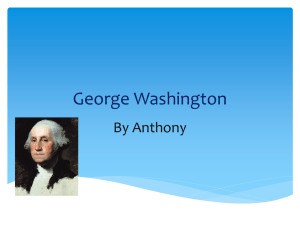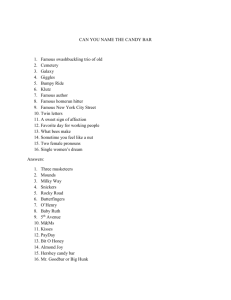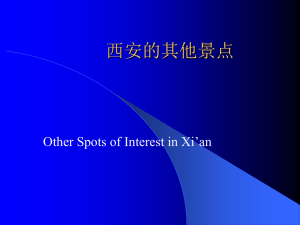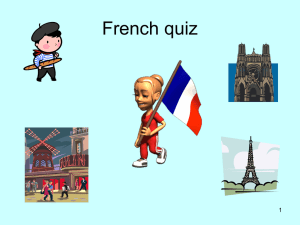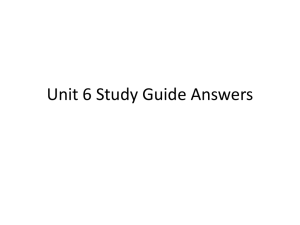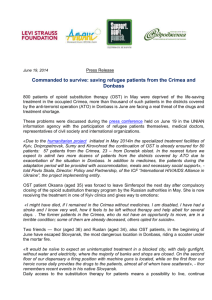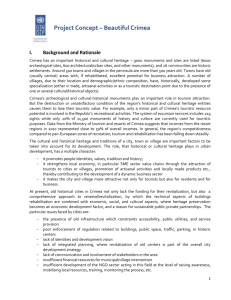People of the Past Topic Web
advertisement
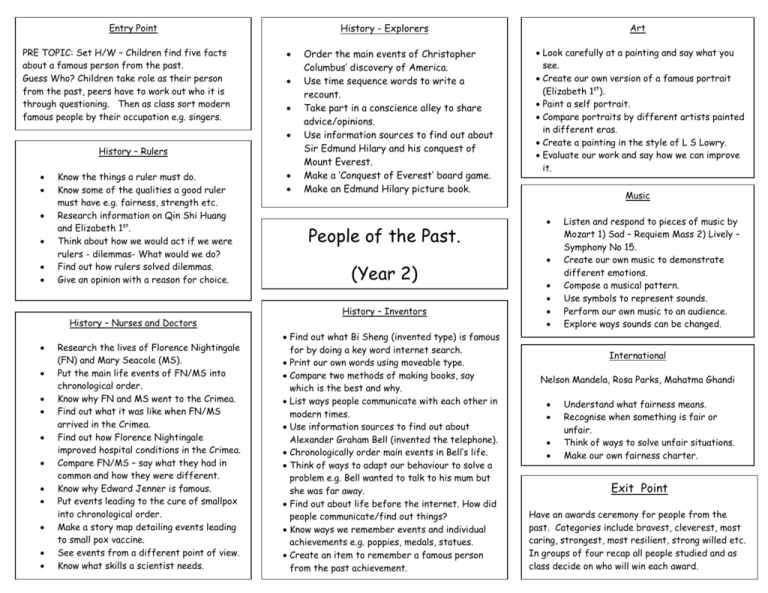
Entry Point PRE TOPIC: Set H/W – Children find five facts about a famous person from the past. Guess Who? Children take role as their person from the past, peers have to work out who it is through questioning. Then as class sort modern famous people by their occupation e.g. singers. History – Rulers Know the things a ruler must do. Know some of the qualities a good ruler must have e.g. fairness, strength etc. Research information on Qin Shi Huang and Elizabeth 1st. Think about how we would act if we were rulers - dilemmas- What would we do? Find out how rulers solved dilemmas. Give an opinion with a reason for choice. History – Nurses and Doctors Research the lives of Florence Nightingale (FN) and Mary Seacole (MS). Put the main life events of FN/MS into chronological order. Know why FN and MS went to the Crimea. Find out what it was like when FN/MS arrived in the Crimea. Find out how Florence Nightingale improved hospital conditions in the Crimea. Compare FN/MS – say what they had in common and how they were different. Know why Edward Jenner is famous. Put events leading to the cure of smallpox into chronological order. Make a story map detailing events leading to small pox vaccine. See events from a different point of view. Know what skills a scientist needs. Art History - Explorers Order the main events of Christopher Columbus’ discovery of America. Use time sequence words to write a recount. Take part in a conscience alley to share advice/opinions. Use information sources to find out about Sir Edmund Hilary and his conquest of Mount Everest. Make a ‘Conquest of Everest’ board game. Make an Edmund Hilary picture book. People of the Past. (Year 2) History – Inventors Find out what Bi Sheng (invented type) is famous for by doing a key word internet search. Print our own words using moveable type. Compare two methods of making books, say which is the best and why. List ways people communicate with each other in modern times. Use information sources to find out about Alexander Graham Bell (invented the telephone). Chronologically order main events in Bell’s life. Think of ways to adapt our behaviour to solve a problem e.g. Bell wanted to talk to his mum but she was far away. Find out about life before the internet. How did people communicate/find out things? Know ways we remember events and individual achievements e.g. poppies, medals, statues. Create an item to remember a famous person from the past achievement. Look carefully at a painting and say what you see. Create our own version of a famous portrait (Elizabeth 1st). Paint a self portrait. Compare portraits by different artists painted in different eras. Create a painting in the style of L S Lowry. Evaluate our work and say how we can improve it. Music Listen and respond to pieces of music by Mozart 1) Sad – Requiem Mass 2) Lively – Symphony No 15. Create our own music to demonstrate different emotions. Compose a musical pattern. Use symbols to represent sounds. Perform our own music to an audience. Explore ways sounds can be changed. International Nelson Mandela, Rosa Parks, Mahatma Ghandi Understand what fairness means. Recognise when something is fair or unfair. Think of ways to solve unfair situations. Make our own fairness charter. Exit Point Have an awards ceremony for people from the past. Categories include bravest, cleverest, most caring, strongest, most resilient, strong willed etc. In groups of four recap all people studied and as class decide on who will win each award.
